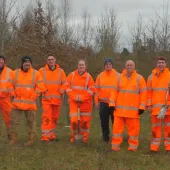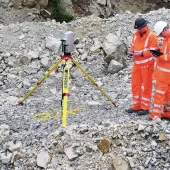Industry support for Million Ponds Project

MPA teams up with Pond Conservation to encourage creation of new clean-water habitats
THE Mineral Products Association (MPA) has announced its support for Phase 2 of the Million Ponds Project by teaming up with the project co-ordinator, Pond Conservation, to encourage the creation of new, high-quality, clean-water ponds, as part of the restoration of aggregate extraction sites or the management of already restored sites.
Ponds are a critical habitat for freshwater wildlife and their creation on aggregate extraction sites can be very cost-effective because earthmoving equipment is often available on site and relatively little space is needed – provided they are protected from pollution.
Both England and Wales have ambitious pond creation targets – Natural England has announced a target of 30,000 new clean-water ponds by 2020 and in Wales there are plans to make around 5,000 new high-quality ponds over the next 10 years. Plans will also be brought forward for Scotland and Northern Ireland.
The MPA says its members are uniquely placed to create new clean-water ponds and will work to assist Pond Conservation in its work to protect and improve the pond resource, and in particular in the implementation of Phase 2 of the Million Ponds Project – a 50-year partnership initiative to create a network of clean water ponds for freshwater wildlife.
During Phase 1 of the project, which ran from 2008-2012, Pond Conservation worked closely with the minerals industry to create ponds on minerals sites providing the foundation for the present initiative.
Nigel Jackson, chief executive of the MPA, said: ‘This partnership will enable our members to build on the biodiversity work they do already to ensure we are contributing what we can to Pond Conservation’s ambitious plans for a million new clean-water ponds.’
Dr Jeremy Biggs of Pond Conservation added: ‘The minerals industry has already made a positive environmental contribution and it has a tremendous opportunity to make new, high-quality, unpolluted ponds. It has the land and the machines, and making ponds is cheap and easy.’









